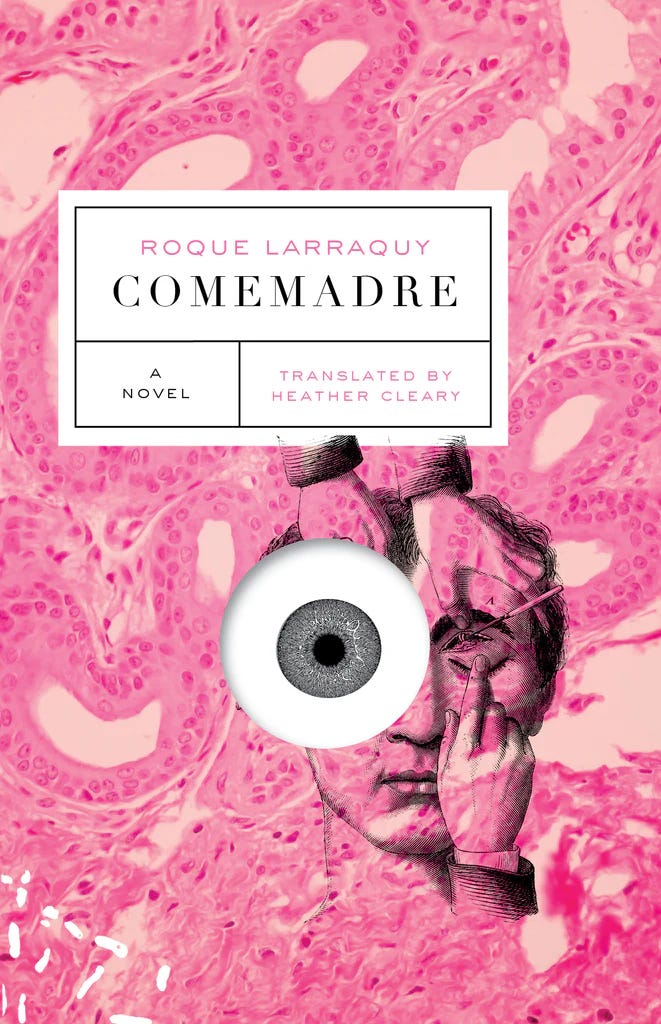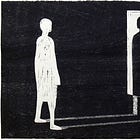no one is neutral here (four things friday, vol 6)
four things this week: a poem, a tv show, a book, and another book
FOUR THINGS FRIDAY! On fridays, I’ll pop into your inbox with a four-item list of things I’ve enjoyed or endured over the past week. Sometimes it’ll be recommendations or miniature reviews; other times, it’ll just be my random musings. Enjoy!
1. THE POEM — I Have a Seat in the Abandoned Theater (2008) by Mahmoud Darwish, Fady Joudah (Translator)
After subscribing to several poetry newsletters at the beginning of the year, I’ve had the pleasure of receiving translated poems delivered right into my inbox each week. This hauntingly quiet piece by Darwish (translated by Joudah) is one of them! This poem uses the metaphor of an abandoned theatre to explore themes of memory and the role of artists not only during times of crisis but also in the silence that follows severe oppression. For me, this poem highlights the importance of using your art to speak for those who can no longer speak for themselves, while also warning you to be mindful of how it is you choose to represent them.
Can you ever truly be an objective observer? And how do you—an artist fortunate enough to have avoided experiencing the oppression firsthand—represent the truth of what happened with respect and integrity?
You can read the excerpt from the poem via Poerty Magazine, here.
2. THE TV SHOW — Say Nothing (2024)
Genre: Historical Drama.
Based on Patrick Radden Keefe’s novel of the same name, Say Nothing is a limited series that throws you into the thick of The Troubles—an ethno-nationalist conflict in Northern Ireland rooted in the island’s division in the 1920s, which led to decades of violence lasting into the late 1990s. While the series follows several dramatised historical figures, its central storyline revolves around the disappearance of a widowed mother of ten, suspected of being an informer for the British authorities. Her abduction becomes a lens through which the show explores the moral complexities of political conflict—and the parts of yourself you may need to discard or destroy in pursuit of a larger cause.
3. THE BOOK — A Short Stay in Hell (2011) by Steven L. Peck
Genre: Literary Fiction.
Pages: 110
Personal Rating: ★★★★.5
Imagine Heaven and Hell are real. Imagine there is one true religion. Now imagine it’s not Christianity, not Islam, not Judaism but rather Zoroastrianism—an ancient pre-Islamic religion founded between 1500 and 1000 BCE, with little more than 200,000 current followers worldwide. Imagine you don’t discover any of this until after you’ve died and been allocated a place in Hell.
Soren Johannson doesn’t need to imagine. After living his life as a proud Mormon, his recent death has now placed him in an infinite library as punishment for believing in the wrong faith. Fortunately for him, if he can find the book of his life amongst the endless surrounding shelves, he’ll be moved out of Hell and up into Heaven. That sounds easy enough… right?
“Well, it was fair when you were sending all the Chinese to Hell who had never heard of Jesus. Wasn’t it? And what a cruel and vicious Hell it was. And your Hell was not our short little correct-you-a-little Hell. This was eternal damnation. At least in the true Zoroastrianism system you eventually get out of Hell. Do you have any idea how long eternity is? My heavens, what an imagination you humans have. What kind of God would leave you burning forever?”
— A Short Stay in Hell (2011)
The book did a lot despite its short length. Peck not only explores faith as a tool of control, but also as a source of self-flagellation, and a means of self-soothing. He explores how we latch onto things in order to cope and how that process can calm us down just as easily as it can turn us mean. But what I appreciated most was Peck’s deliberate choice to populate Soren’s Hell with people who looked just like him.
How delighted I would be to meet someone from Africa or Asia. Someone with a different story to tell. The never-ending sameness of all those I knew somehow blended with the sameness of this Hell. The same rooms, the same railings, the same kiosks, the same bedrooms with the same bathrooms, the same signs, with the same rug, and the endless stacks of books all bound with unerring sameness, seemed to match the sameness of the people, all white, all American, all died between 1939 and 2043, the same outlooks, the same haircuts, the same maddening habits. Homogeneity everywhere, endlessly stretching into an eternity of monotony.
— A Short Stay in Hell (2011)
The whiteness and the Americanness of Hell’s population served a dual pupose: first, to amplify the banality of the place, and second, to critique culutural homogeneity and intellectual conformity. Soren is surrounded by people who look alike, sound alike, think alike. Despite being surrounded by hundreds of thousands of other people damned to Hell, his constant interactions with the same sort of people makes it harder for him to find answers or a quicker path to Heaven. This endless loop of sameness powerfully symbolised the spiritual dead-end of living a life within a cultural echo chamber, and Soren is left craving all the differences that he failed to appreciate and properly respect while he was alive.
4. THE BOOK — Comemadre (2018) by Roque Larraquy, Heather Cleary (Translator)
Genre: Literary Fiction. Horror. Translated Fiction (Spanish to English).
Pages: 148
Personal Rating: ★★★★
The first section of the book is set in 1907, in a sanatorium on the outskirts of Buenos Aires, where a group of doctors become fascinated by the theory that the human head remains conscious for nine whole seconds after decapitation. This curiosity quickly spirals into a full-blown obsession that grips the entire staff. Every doctor—including our narrator and main character, Dr. Quintana—conspires to lure terminally ill patients into the facility with the promise of a cancer-curing serum, only to then use them to investigate those supposed nine seconds of post-decapitation awareness further.
The second half of the book takes place in 2009. Rather than continuing on with the absurd doctors of the previous century, this section follows the great-grandson of the sanatorium’s former supervisor, where the original experiments (read: mass killings) were conducted. Told through a series of letters and introspective reflections, this part chronicles the unnamed man’s musings on his self-destructive performance art, as he uses his own body in pursuit of artistic truth.
Ledesma skewers a piece of meat and swings it around as he talks, splattering us with its juices. He says he went to Berlin once, and witnessed a fire in a cabaret. Our thoughts turn to German women. It started with a cigarette. The fire spread, and everyone was trapped inside. When it reached the liquor, the whole place went up. No one was saved. The only thing to do was wait for the blaze to burn itself out. Ledesma spent the night discussing the fire with other onlookers. It was morning before he realized that, as a doctor, he might be of use in the collection of bodies.
— Comemadre (2010)
The only reason this book isn’t getting a five-star rating from me is because, admittedly, I enjoyed the first section so deeply that the shift to the second felt jarring. I spent most of the latter half wishing Larraquy would take me back to the darkly humorous horrors of the sanatorium and Dr. Quintana’s messed-up worldview.
Once I got over the change (and myself), I was able to truly appreciate what Larraquy was doing with both narratives. Comemadre centres itself around the fear of death and the desperate ways humans try to control or deny it. While attempting to defy mortality, both scientific and artistic ambition quickly become detached from empathy and ethical boundaries, with each practice serving as masks for violence. Human bodies are reduced to mere objects and instruments in service of grand ideas—none of which offer a real or attainable goal.
Ideally, according to him, we would find the real cure by asking the heads to snatch the formula right out from under God’s nose.
— Comemadre (2010)














A Short Stay in Hell has been on my list for a while! I’m excited to read it.
You'd love the modern poetry in translation magazine 🥹🥹🥹 so many great gems in there!!!!